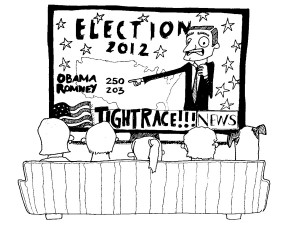Media must avoid sensationalism
As news outlets started calling the election for President Barack Obama on Tuesday night, I couldn’t help feeling like we could have called it a long time ago. Even if Republican Mitt Romney hadn’t had such a clumsy campaign, it’s become increasingly rare for an incumbent president to lose, especially an unchallenged one. And Obama is relatively well liked; people might have started questioning more of his decisions as the possibility of a Romney presidency became more real, but for the most part, he retained a significant amount of support from his 2008 campaign.
Why, then, did it seem like the election came down to the wire? Throughout the campaign and up until Election Day, the media sensationalized what would have otherwise been a straightforward election and let partisan politics negatively affect good, sound journalism. News publications shouldn’t sacrifice journalistic integrity for the sake of more exciting stories, especially concerning such a significant event.
This doesn’t just concern Election Day, either; careless and sensationalist journalism remained a problem throughout the campaign. Look at the coverage of the first debate. News publications weren’t focusing on the fact that many of the candidates’ claims, especially their economic policies and statistics, were often speculative or false. They instead overanalyzed Romney’s Big Bird comment and took the debate as an opportunity to tell a comeback story. The media took Romney’s best performance and spun it as if he had changed the nature of the election in his favor, although Obama ended up with almost 100 more electoral votes than Romney.
This kind of sensationalism goes both ways, however. According to a Pew Research Center study, 72 percent of campaign coverage over a 10-week period was negative for Obama and 71 percent was negative for Romney. The media’s narrow focus on gaffes, partisanship and trivial stories led Americans to focus on the wrong aspects of the election; where publications should have been fact checking and reporting on campaign events, they entertained readers with meaningless but superficially controversial stories.
Take, for example, the Pennsylvania voting machine that wouldn’t allow voters to select Obama’s name. A man took a reportedly unaltered video of himself selecting Obama, only for Romney’s name to be highlighted. This was a mistake that briefly prevented someone from voting, but it should hardly be news: The machine was later recalibrated and returned to service. The story, however, was reported by NBC, The Washington Post and The Huffington Post. It doesn’t matter if these publications claim foul play was involved or not; they aren’t reporting about a broken voting machine, they’re spreading a story in which Obama is portrayed as a victim.
This is not to say that all election coverage was done poorly — especially toward the end of Tuesday night, most major news stations were releasing accurate and up-to-date information. And even during the candidates’ campaigns, there were plenty of fact-checkers and reliable sources serving as a counternarrative to the divided and distracted media.
But the good journalism gets lost, and what sticks out most are over-quoted slips of the tongue and entertaining rumors. Romney’s 47 percent comment and Obama’s comparison of battleships to bayonets received far more attention than they should have, and speculation on the online political forum Democratic Underground that Romney had applied a fake tan before his interview with Latino television station Univision was quoted by publications as prominent as Gawker and The Huffington Post.
The role of news in politics should be first and foremost providing information. When publications sloppily report on an event as important as the presidential election, they risk misinforming voters. As the link between voters and candidates, media is an essential part of politics — journalists need to keep in mind what constitutes actual reporting.
Burke Gibson is a sophomore majoring in economics and is the Daily Trojan’s chief copy editor. His column “Press Pass” runs every other Thursday.

